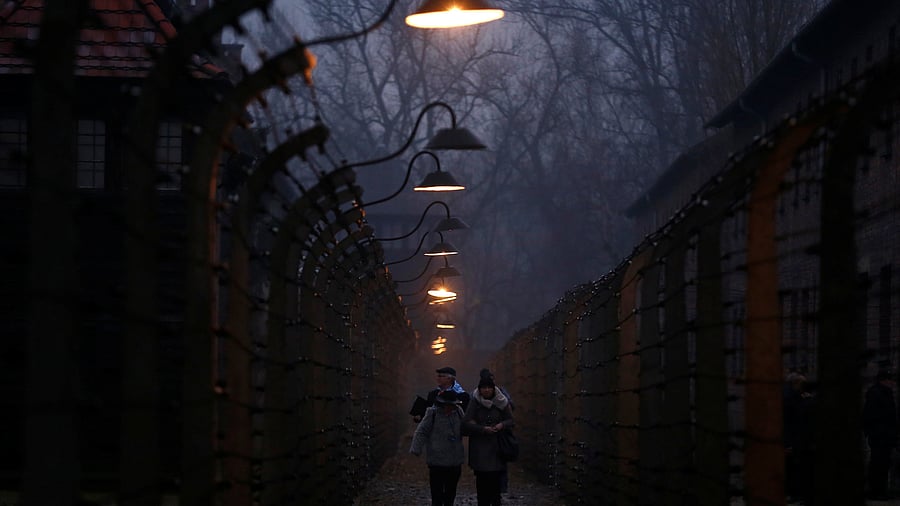
73rd anniversary of the liberation of the Nazi German concentration and extermination camp Auschwitz-Birkenau
Credit: Reuters photo
The first post-war president of Germany, Theodor Heuss, had famously described the Holocaust as the cause for collective shame, not collective guilt.
But every generation of post-War Germans actually felt a sense of collective guilt over the mass extermination of Jews and others during the darkest chapter of the country’s history. An estimated six million Jews, and five million others, including Roma and Sinti people, had perished in the genocide carried out by the Nazi regime of Adolf Hitler.
Subsequent German governments, first in Bonn (capital of West Germany) and later in Berlin, had maintained that Germany had an obligation to support the state of Israel and fight antisemitism. While post-war Germany had seen not-so-successful de-Nazification efforts, successive governments had to tread cautiously since anti-semitism is often equated with Nazism, which the country despises.
This is considered one of the reasons why Germany refused to join the club of European and Western nations, which recently recognised the state of Palestine. Germany, in short, feels obligated to Israel. Berlin, while supporting the humanitarian cause of the Palestinian people, stood out by not joining France, Belgium, Britain, Australia, Canada, Portugal, and others in recognising the Palestinian state.
German Chancellor Friedrich Merz had days before the Gaza ceasefire ruled out any change in his country’s long-held position when asked ahead of the recent UN General Assembly, where many countries recognised the Palestinian statehood. In keeping with Germany’s unalterable position, he had instead reminded that recognition of the Palestinian state should ideally be the final step in the peace process, that too a “two-state solution.”
Pressure from the German people and civil society failed to budge the conservative-led government, which, in August, quite surprisingly, stopped exports of key weapon systems to Israel. Driven by its steadfast obligation to Israel, as a sort of retribution to the sufferings of the Holocaust victims, Germany had over the years become the second-largest arms supplier to Israel, after the US.
Yet, Germany is among the top donors to UN aid efforts in Palestine. Berlin has been a vocal advocate for a peaceful Middle East, especially since Germany is home to the largest chunk of over 100,000 Palestinians living in Europe.
But unlike Qatar, Egypt, and Turkey, Europe was largely uninvolved in the ceasefire negotiations. Germany and France are pushing for a
UN role in securing peace in Gaza, and perhaps have a voice in its implementation, being members of the comity of nations. Israel and the US are, however, sceptical of the UN, especially since it censured Israel for committing genocide in Gaza.
After winning the February elections, Merz had kicked up a row by declaring he would invite Benjamin Netanyahu to Germany in defiance of the Internal Criminal Court arrest warrant against him. Staunchly pro-Israel, Merz had, however, declared in August that Israel’s military assaults on Gaza would not achieve Tel Aviv’s goal of eliminating Hamas.
Ceasefire, a breather
Just days before the US-brokered ceasefire came into force, Merz had shocked even his supporters by declaring that Germany would drop out of the 2026 Eurovision Song Contest if Israel was excluded. On the contrary, Spain, the Netherlands, Ireland, Iceland, and Slovenia had earlier decided to boycott the 70th anniversary edition of Eurovision, set to take place in Vienna in May 2026, if Israel is allowed to participate.
Even Merz’s predecessor, Olaf Scholz of the Centre-Left Social Democratic Party, had reassured his country’s continued support for Israel. “We will never forget the suffering and the millions of (Holocaust) victims,” he had said in 2022, emphasising a “perpetual responsibility” for Israel’s security.
Notwithstanding such a tight-rope walk necessitated by its obligation to Israel, successive governments in Berlin have consistently spoken against human rights violations in Palestine. The “special relationship” Germany maintains with Israel has, however, been under tremendous pressure from its own citizens who rallied for Palestinians.
The Israeli ground and air campaign against Gazans, all in the name of “eliminating” Hamas, had triggered massive protests in Germany. An estimated 67,000 people, a third of them under the age of 18, were killed in the two-year war triggered by the deadly October 7 attack by Hamas that killed more than 1,200 Israelis and took over 200 hostages.
While a ceasefire that holds is the best thing for all stakeholders, Germany will breathe easy as it doesn’t have to juggle between its obligation to Israel and humanitarian responsibility towards the Palestinians, and join in the peace and reconstruction efforts as Gazans return to the bombed-out ruins of what was once home.
(The writer is a senior
journalist based in Berlin)